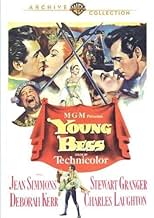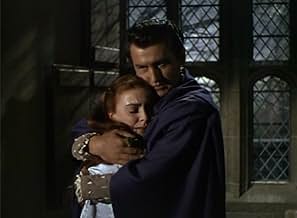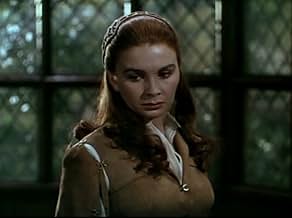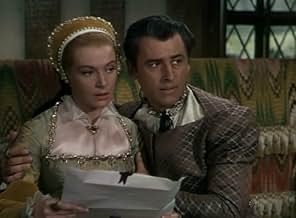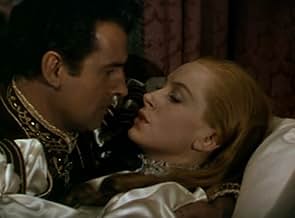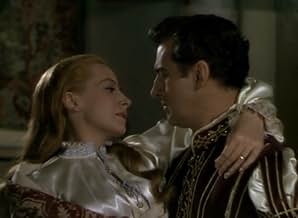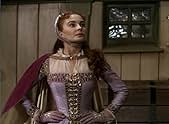Füge eine Handlung in deiner Sprache hinzuThe early life of Elizabeth I, from her childhood until her accession to the throne of England in 1558.The early life of Elizabeth I, from her childhood until her accession to the throne of England in 1558.The early life of Elizabeth I, from her childhood until her accession to the throne of England in 1558.
- Regie
- Drehbuch
- Hauptbesetzung
- Für 2 Oscars nominiert
- 1 Gewinn & 4 Nominierungen insgesamt
Empfohlene Bewertungen
Anyway, in the film, Elizabeth (I) was madly in love with Thomas Seymour. From historical records, Thomas was supposedly the person who made advances on Elizabeth (I) but was unsuccessful. In the film, Edward Seymour was seen as a callous power hungry puppeteer in the royal court. In history, he was a successful military man when he battled oppositions at Pinkie, Scotland (1547). Edward was also responsible for religious reforms and in relaxing heresy and treason laws. In the film, he sent his brother Thomas to the scaffold because of his paranoia over power struggle threats. In history, the execution of Thomas by the council in 1549 was a significant blow to Edward and it weakened his power in England. The eventual arrest and execution of Edward in 1552 was conspired by John Dudley, Earl of Warwick and Thomas Wriothesley, Earl of Southampton to remove Seymour's protectorate power over his nephew, King Edward VI. Edward VI died at the age of 15 in 1553. Dudley induced the council to proclaim his daughter-in-law, Lady Jane Grey, as queen after Edward VI's death. Dudley was executed in 1554 by Mary (I) for treason.
Of course, there's no way of knowing precisely what really happened in history. But in rationale, a person should not be defamed or condemned (as in the case of Edward Seymour) based on hearsay, idle gossip, a romantic novel or a chick flick, even if they are dead over a few centuries. In theory, anyhow.
Anyway, I did enjoy this film as pure entertainment. Walter Plunkett's costume design was magnificent and the whole cast was superb. Miklos Rozsa's emotional music score was an incredible soul wrenching delight.
Is it worth seeing? Yes, definitely! It's entertaining, well acted and beautifully produced.
There is one film about the Normans of William's time - THE WARLORD (1965) with Charleton Heston and Richard Boone. It's a very good film, but it never shows William. No films about St. Edward the Confessor, Ethelred the Unready, William Rufus, or Hardecanute (remember the Danish Viking ruler of England who whipped the disobedient waves of the Channel).
The first major English monarch who is made the subject of a big film is Henry II, the role played (both times) by Peter O'Toole in BECKET and THE LION IN WINTER. Significantly his two roles stem from two major plays of the 1950s and 1960s. His son Richard I ("the Lion-Hearted") appears in THE LION IN WINTER, but earlier films included THE CRUSADES, ROBIN HOOD, IVANHOE, KING RICHARD AND THE CRUSADERS, and ROBIN AND MARION. Richard is really the first English monarch to appear in more than just a couple of films - but notice, even though he is a central figure the films tend to deal with the Third Crusade he helped to lead, or the machinations of his brother "Prince John", or the possibly fictional figure of Robin, Earl of Locksley (known as "Robin Hood"). While THE CRUSADES and KING RICHARD AND THE CRUSADERS deal with him and Berengaria (his wife), and try to build a romantic and chivalric triangle between them and Saladin, the actual sexual interests of Richard seem to be closer to the performance of Anthony Hopkins in THE LION IN WINTER.
Oddly there is no film about King John and his failure to control his nobles (not even a film version of Shakespeare's historic play, although a television movie version was made starring Leonard Rossiter as John in the 1980s - but the BBC were filming the entire series of the plays). Nor of the fights led by Simon De Montford against Henry III that led to the creation of the House of Commons. Occasional films pick up on a few monarchs - BRAVEHEART giving a look at Edward I and his witless son; Christopher Marlowe's EDWARD II showing what happened to the witless son; CHIMES AT MIDNIGHT being Orson Welles's take on Henry IV and Prince Hal (but concentrating on Sir John Falstaff); and both Olivier and Branagh dealing with HENRY V in two startling great and different interpretations. Then there is another biggie: Old Crookback - RICHARD III in Olivier's production set in the 1470s and 1480s, or the version by Sir Ian McKellan set in the 1930s, or TOWER OF London with Rathbone (a distinctive Richard) abetted by Karloff, and then a version with Vincent Price (who was Clarence in TOWER OF London).
This brings us to the champs of British Royals in film - the Tudors. Henry VII always pops up in the Richard films (he has to - he wins at Bosworth Field). Yet no film specifically about Henry VII has been made. Not so Henry VIII, Edward VI, Jane Gray, and Elizabeth (not much for "Bloody Mary") though. THE PRIVATE LIFE OF HENRY VIII, THE SIX WIVES OF HENRY VIII, A MAN FOR ALL SEASONS, ANNE OF A THOUSAND DAYS, THE PRINCE AND THE PAUPER (at least 3 versions, including one called CROSSED SWORDS), YOUNG BESS, SIX DAY QUEEN, ELIZABETH, MARY OF Scotland (Mary, Queen of Scots, was Henry VIII's niece), MARY, QUEEN OF SCOTS, THE VIRGIN QUEEN, THE SEA HAWK, FIRE OVER ENGLAND, THE PRIVATE LIVES OF ELIZABETH AND ESSEX / ELIZABETH THE QUEEN, Shakespeare IN LOVE. No other British Royal Family has been as chronicled in films as the Tudors. Think of it. Charles I was the center of so much turmoil that he eventually was executed after a trial following a series of Civil Wars he lost to Oliver Cromwell. Only one film about him was made - and a bad one - CROMWELL (emphasizing the victor of those wars). But the Tudors generate more interest - there is more skulduggery and treason in their reigns than most, and England becomes a great nation (and a cultural fountainhead) at the end of it all.
YOUNG BESS is a small joy - it deals with the forgotten career of Admiral Thomas Seymour, uncle of King Edward VI, and would-be romantic wooer of Princess Elizabeth. He also was the last of Katherine Parr's three husbands (Henry VIII being the second). It is the second time that Laughton plays the great monarch, and the terrible fury of the man is shown in two shots showing his hand caressing the neck of Elizabeth's doomed mother Anne Boleyn, and later caressing the neck of the doomed Catherine Howard in the same way. Most interesting is the casting of Jean Simmons and Steward Granger as Princess Elizabeth and Admiral Tom Seymour. They were married at the time, so their scenes together have an extra-something to them (like the Burtons some ten years later). YOUNG BESS is not accurate history, but it is good film making. You will view this film with satisfaction.
Wusstest du schon
- WissenswertesCast as on-screen lovers Young Bess (Queen Elizabeth I) and Sir Thomas Seymour, in real life Jean Simmons and Stewart Granger were married to each other when this movie was filmed. Granger (né James Stewart) and Simmons met in 1946 while working on the picture Caesar und Cleopatra (1945). They would meet again over a year later, with Simmons now a grown up 18. The relationship soon turned to romance, and the couple appeared in a film that reflected their own situation. In Adam und Evelyne (1949), Granger plays a man in love with a younger woman. Later, after divorcing his first wife, Granger and Jean married on December 20, 1950. He was 27. The bride was 21. They also appeared together in Zwischen Haß und Liebe (1955). Simmons said of her scenes with Granger in the film, "I feel more self-conscious about playing love scenes with him now, than I did before we were man and wife." But the chemistry flourished on screen.
- PatzerIn the film, young Bess is mostly referred to as "Princess Elizabeth". In history, Elizabeth was denied that title from the age of three. Her father Henry VIII declared his marriage to Anne Boleyn invalid before her execution for treason, thus Elizabeth was declared illegitimate and only to be called "Lady Elizabeth".
- Zitate
Prince Edward: [muttering to Tom about Uncle Ned, who rules while Edward is King as a minor] I wish he'd die.
Thomas Seymour: What? What was that?
Prince Edward: I said, I wish he'd die. D-Y-E.
Thomas Seymour: It's the wrong spelling.
Prince Edward: [nonchalant] Oh, is it?
Ned Seymour: What is Your Majesty talking about?
Prince Edward: Spelling. Nobody knows for certain how to spell the King's English.
Ned Seymour: The spelling is not important, so long as the word carries the right meaning.
Thomas Seymour: The word His Majesty had *exactly* the right meaning.
- VerbindungenFeatured in The World According to Smith & Jones: The Tudors (1987)
Top-Auswahl
- How long is Young Bess?Powered by Alexa
Details
- Erscheinungsdatum
- Herkunftsland
- Sprache
- Auch bekannt als
- Young Bess
- Drehorte
- Produktionsfirma
- Weitere beteiligte Unternehmen bei IMDbPro anzeigen
Box Office
- Budget
- 2.423.000 $ (geschätzt)
- Laufzeit1 Stunde 52 Minuten
- Seitenverhältnis
- 1.33 : 1(original ratio)
Zu dieser Seite beitragen



